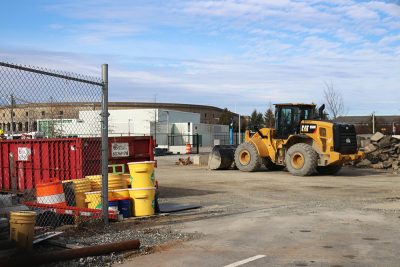
Harvard University’s construction plans in Allston have received pushback from the community.
Harvard is the largest landholder in Allston-Brighton — owning a third of all of the land — and plans to renovate about 170 acres to create what it calls its new “Enterprise Research Campus” and to remodel the Beacon Park Yard, a now-defunct railyard.
The Coalition for a Just Allston-Brighton — a group aimed at uniting local residents — requested that Harvard make “significant commitments” to residents in terms of sustainability, affordability and inclusivity, as detailed in a 19-page letter sent to Mayor Michelle Wu on March 15.
“Harvard’s long-term goal for the ERC and Beacon Park Yard is to transform these obsolete and largely impermeable industrial sites into new, vibrant, equitable and welcoming districts that will complement and enrich the Allston-Brighton neighborhood,” Harvard wrote in a letter Feb. 23 to Wu and other City officials.
The Boston Redevelopment Authority approved Harvard’s expansion plan in 2013. The college will begin construction on the ERC in 2022 with the first development consisting of six acres of land that will be turned into a hotel, residential buildings, conference center, public green space and retail space.
Kevin Carragee, a member of CJAB and a journalism and media professor at Suffolk University, said the new development could harm the Allston economy.
“Harvard, the wealthiest university in the world, and Tishman Speyer, an international developer, for-profit, with assets of $121 billion, they are going to make a fortune on the Enterprise Research Campus,” Carragee said. “What is the community going to receive from the Enterprise Research Campus? Frankly, very little.”
CJAB wrote Harvard University’s expansion plans will “cause significant harm to their community” in a March 15 press release.
“[The renovation will replicate] the problems and inequities of Boston’s Seaport District: unaffordable, exclusionary housing; inadequate public transportation; traffic congestion; lack of resilience in the face of the climate crisis; and limited opportunity for local businesses,” CJAB wrote.
Harvard said it will dedicate 20% of housing in future Allston projects as income-restricted — meaning they will be reserved for households earning below a certain income — and 25% of retail space for local companies or those owned by women or people of color.
Anthony D’Isidoro, president of the Allston Civic Association and member of the Harvard Allston Task Force, said many people who grew up in Allston may not be able to afford staying there anymore because the area has become too expensive.
“We want to take this once-in-a-lifetime opportunity where we’ve got 36 acres of the Enterprise Research Campus to start with, and build a world-class, inclusive, diverse and equitable community where people can live and work and enjoy all the benefits,” D’Isidoro said.
Cindy Marchando, chair of Harvard Allston Task Force and a third-generation resident of Allston, said she is concerned that her granddaughter would be displaced from the community in her 20s, when the projects would be completed.
“What will the world look like for her at that time?” Marchando said. “Is it going to be segregated? Is it going to be a place for only a certain type of people [or] whether [you have] a certain type of job? Is it going to be inclusive or exclusive? And no one can speak to that because no one has a vision of what that looks like.”
D’Isidoro said in 1997, Boston’s mayor at the time, Tom Menino, as well as Allston residents, were “very upset” after they found out that Harvard anonymously purchased land over the course of eight years to expand the Harvard Business School’s existing campus in Allston.
D’Isidoro added he hopes Allston residents would have a chance to negotiate about what would best serve the community.
“We’re just simply looking for a place at the table that we feel we’re on equal footing with Harvard when it comes to planning out our community for the next few generations,” he said.
Carragee also emphasized the Task Force’s willingness to work with the college.
“We’re not opposed to the development of Harvard’s land. They own it, it’s good to be developed. The question is, will it be developed in a way that enhances Allston-Brighton or harms it?” he said.
Marchando said the community wants to have a “shared vision” with Harvard in order to allow Allston-Brighton to prosper.
“This is a once-in-a-lifetime chance for Harvard to be a model for the equitable, resilient, inclusive urban redevelopment,” Marchando said. “[They] do have a lot of resources that they can actually utilize to make this a community that everyone will be proud of.”



















































































































